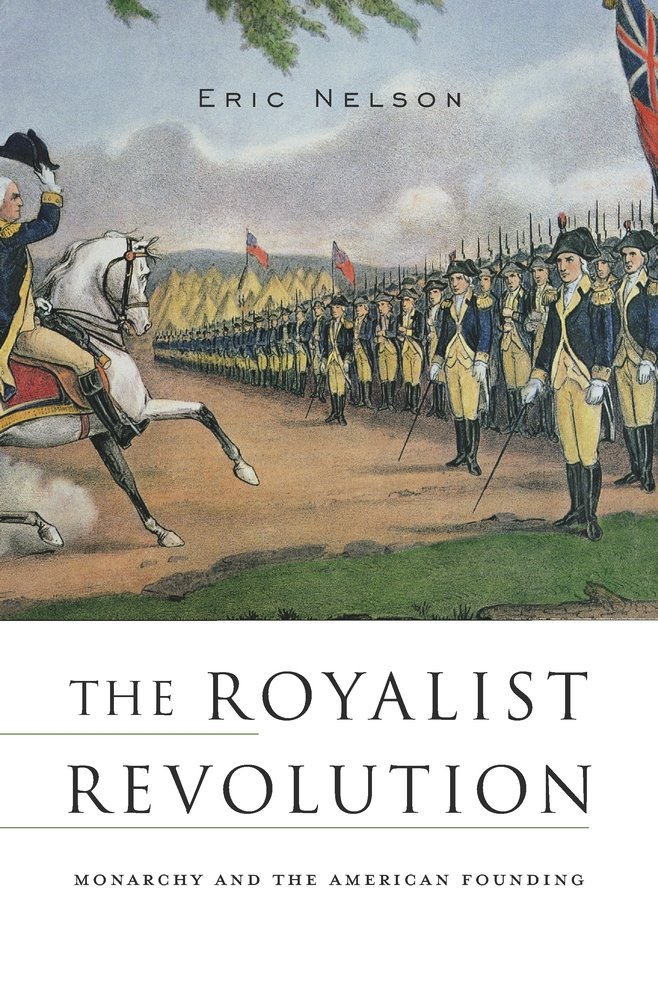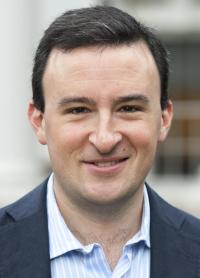The Royalist Revolution
by Eric Nelson

The Royalist Revolution: Monarchy and the American Founding
By Eric Nelson
400 pp., Belknap Press
$21.46
Generations of students have been taught that the American Revolution was a revolt against royal tyranny. In this revisionist account, Eric Nelson argues that a great many of our Founding Fathers saw themselves as rebels against the British Parliament, not the Crown.
“The Royalist Revolution” interprets the patriot campaign of the 1770s as an insurrection in favor of royal power — driven by the conviction that the Lords and Commons had usurped the just prerogatives of the monarch.
“Leading patriots believed that the Colonies were the king’s own to govern, and they urged George III to defy Parliament and rule directly,” explains historian and author Eric Nelson. “These theorists were proposing to turn back the clock on the English constitution, rejecting the Whig settlement that had secured the supremacy of Parliament after the Glorious Revolution.”
Instead, he writes, they embraced the political theory of those who had waged the last great campaign against Parliament’s “usurpations”: the reviled Stuart monarchs of the 17th century.
When it came time to design the state and federal constitutions, the very same figures who had defended this expansive conception of royal authority ― John Adams, Alexander Hamilton, James Wilson, and their allies — returned to the fray as champions of a single executive vested with sweeping prerogatives. As a result of their labors, the Constitution of 1787 would assign its new president far more power than any British monarch had wielded for almost a hundred years. On one side of the Atlantic, Nelson concludes, there would be kings without monarchy; on the other, monarchy without kings.
Congratulations to Eric Nelson, whose book was a contender for the 2015 George Washington Prize. Scroll down for our Q&A with the author.
 Grateful American™ Foundation: What inspired you to write this book?
Grateful American™ Foundation: What inspired you to write this book?
Eric Nelson: I stumbled into this project very much by accident. A group of undergraduates came to my office hours in 2008 to complain that there was no course at Harvard on the American Revolution. My initial response was: “Look harder!” But it turned out that they were right. This seemed unfortunate to me, not least because my office is about 400 yards away from the spot where Washington mustered the Continental Army in July 1775. So I decided to put together a course on the political thought of the Revolution. The topic had always fascinated me, and I had written about it in a cursory way in my first book, but it took a good deal of work to bring myself up to speed. As I read my way through the pamphlet literature of the period in detail, I began to see the story of the Revolution quite differently.
Grateful American™ Foundation: What are the three big lessons you hope readers will take away from it?
Eric Nelson: I would point to two primary lessons. The first is purely historical. We have long been taught that British Americans were driven to Revolution in 1776 by anti-monarchical zeal and a terror of executive corruption. This traditional story is, however, largely false. Unlike the two seventeenth-century English revolutions and the French Revolution, the American Revolution was fundamentally a rebellion against a legislature, not against a king. It was, in fact, an insurrection in favor of royal power.
Those colonists we call “patriots” responded to the passage of the Stamp Act and other perceived abuses of the 1760s and 1770s by developing the view that Parliament possessed no jurisdiction whatsoever over British North America.
Instead, as Alexander Hamilton argued, the colonies were connected to Britain solely through “the person and prerogative of the king.” But the monarch in late eighteenth-century Britain was in no position to govern an empire of far-flung, distinct dominions.
The constitutional settlement that followed the Revolution of 1688-89 had subjected the king to Parliament, drastically curtailing his prerogatives and recasting him as a pure “executive.” Most powers of state that legally remained with the crown were no longer wielded by the king in person, but rather by ministers who were required to command a parliamentary majority.
Patriots were effectively proposing to turn back the clock on the English constitution by over a hundred years — to separate the king from his Parliament and his British ministers, and to restore ancient prerogatives of the crown, especially the king’s veto power, or “negative voice.” These colonists wanted more monarchy, not less. When they finally turned on George III, it was because he refused to wield the powers they offered.
Grateful American™ Foundation: Tell us about the second lesson of the book.
Eric Nelson: This lesson has to do with how we ought to understand our form of government and its distinctive challenges. We need to recognize that the figures who pioneered this highly “prerogativist” understanding of monarchy during the imperial crisis — John Adams, James Wilson, Alexander Hamilton, James Iredell, Benjamin Rush, and their allies — never changed their minds.
They fiercely opposed the weak executives of the first state constitutions, and ultimately presided over a broad resurgence of Royalist constitutionalism in the late 1770s and 1780s. Their great triumph came in the Philadelphia Convention of 1787, when delegates agreed to invest the new president of the United States with many of the same prerogative powers that these “patriot Royalists” had unsuccessfully urged George III to revive 15 years earlier.
The result, as John Adams shrewdly observed in 1789, is that our form of government most closely resembles an extinct version of the English constitution: the “mixed” or “limited” monarchy of the 17th century. If, like Adams, we take this comparison seriously, we will notice that our current political travails are eerily similar to those that beset the monarchies of James and Charles I.
Grateful American™ Foundation: When was the moment in your childhood / life when you developed a passion for American history? And what do you think can be done to inspire more kids to get excited about learning about the past?
Eric Nelson: I actually came to American history a bit late. As a very small child, I was obsessed with ancient Egypt (I even tried to teach myself hieroglyphics — without any great success), and I subsequently fell in love with Greek and Roman history, and then English history in turn. American history, by contrast, seemed altogether too recent and too familiar.
This brings me to my thought about how we might evangelize for the discipline more effectively among young people. The great temptation is always to project the present backwards onto the past — to conceive of the way we live now as the natural, inevitable unfolding of how they lived then.
This sort of anachronism is not only distorting and methodologically unsound — it is also exceedingly boring. The more we can accentuate the essential strangeness of the American past, and the degree to which our ancestors lived in a world that was fundamentally different from our own (and which, but for a series of highly contingent events, might have generated any number of alternative presents), the more exciting we will make the subject for students.
Grateful American™ Foundation: If you win the George Washington Prize, what will you do with the prize money — and what will be your goal to accomplish during your year of being the reigning Award winner?
Eric Nelson: I will be spending the upcoming year on sabbatical, working on a new book about the theory of justice. This project is far more philosophical than historical, so it will present a very different set of challenges. I greatly look forward to diving in.
The results are in!
In addition to Eric Nelson’s “The Royalist Revolution,” be sure to check out the books that were also up for the 2015 prize.




